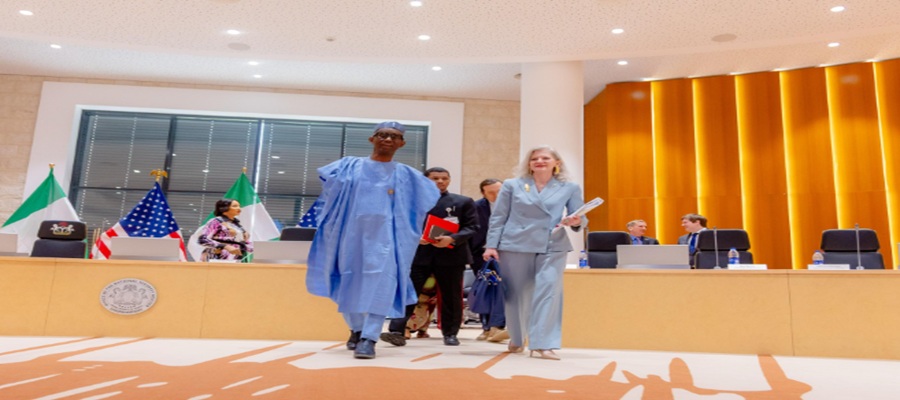General News
Google Rolls Out AI-Powered Theft Detection for Android 15

Thembi Alfreds was driving home from a soccer match in Johannesburg when she stopped at a traffic light. A thief suddenly appeared and smashed the window of her car, grabbing her phone. She struggled with the thief but they managed to get away with the phone.

The incident left her feeling violated and unsafe. Not only did she lose personal memories, like photos of her children, but her personal and financial information stored on the phone was now compromised.
Phone theft is a serious concern in many countries across Africa, including South Africa, where Thembi’s situation highlights the need for better phone theft solutions.
Smartphone usage is on the rise in Sub-Saharan Africa, with adoption rates reaching 61% in Kenya, 31% in Uganda, and 24-25% in Rwanda and Burundi. This increased uptake has been accompanied by a rise in cellphone theft, as these devices become attractive targets for criminals due to their resale value and sensitive data within. This poses a significant challenge that can have serious consequences for both individuals and businesses in the region.
According to the GSMA Consumer Survey 2023, 19% of mobile phone users in South Africa experienced theft or loss of their device in the past year.The GSMA reports millions of devices stolen every year, and the numbers continue to grow. With our phones becoming increasingly more valuable & central to storing sensitive data, like payment information and personal details, losing one can be an unsettling experience.
Phone theft can be a traumatic experience, but there are steps that can be taken to reduce the risk and protect personal information. That’s why we have developed and thoroughly beta tested, a full suite of features designed to protect you and your data at every stage – before, during, and after device theft.
These advanced theft protection features are now available to users around the world through Android 15 and a Google Play Services update (Android 10+ devices).
Theft Detection Lock uses powerful AI to proactively protect you at the moment of a theft attempt. By using on-device machine learning, Theft Detection Lock is able to analyze various device signals to detect potential theft attempts. If the algorithm detects a potential theft attempt on your unlocked device, it locks your screen to keep thieves out.To protect your sensitive data if your phone is stolen, Theft Detection Lock uses device sensors to identify theft attempts.
This feature is rolling out gradually to ensure compatibility with various devices, starting today with Android devices that cover 90% of active users worldwide. Check your theft protection settings page periodically to see if your device is currently supported.
In addition to Theft Detection Lock, Offline Device Lock protects you if a thief tries to take your device offline to extract data or avoid a remote wipe via Android’s Find My Device. If an unlocked device goes offline for prolonged periods, this feature locks the screen to ensure your phone can’t be used in the hands of a thief.
If your Android device is lost or stolen, Remote Lock can quickly help you secure it. Even if you can’t remember your Google account credentials in the moment of theft, you can use any device to visit Android.com/lock and lock your phone with just a verified phone number. Remote Lock secures your device while you regain access through Android’s Find My Device – which lets you secure, locate or remotely wipe your device. As a security best practice, we always recommend backing up your device on a continuous basis, so remotely wiping your device is not an issue.
These features are now available on most Android 10+ devices via a Google Play Services update and must be enabled in settings.
Advanced security to deter theft before it happens
Android 15 introduces new security features to deter theft before it happens by making it harder for thieves to access sensitive settings, apps, or reset your device for resale:
- Changes to sensitive settings like Find My Device now require your PIN, password, or biometric authentication.
- Multiple failed login attempts, which could be a sign that a thief is trying to guess your password, will lock down your device, preventing unauthorized access.
- And enhanced factory reset protection makes it even harder for thieves to reset your device without your Google account credentials, significantly reducing its resale value and protecting your data.
Later this year, we’ll launch Identity Check, an opt-in feature that will add an extra layer of protection by requiring biometric authentication when accessing critical Google account and device settings, like changing your PIN, disabling theft protection, or accessing Passkeys from an untrusted location. This helps prevent unauthorized access even if your device PIN is compromised.
Real-world protection for billions of Android users
By integrating advanced technology like AI and biometric authentication, we’re making Android devices less appealing targets for thieves to give you greater peace of mind. These theft protection features are just one example of how Android is working to provide real-world protection for everyone. We’re dedicated to working with our partners around the world to continuously improve Android security and help you and your data stay safe.
You can turn on the new Android theft features by clicking here on a supported Android device. Learn more about our theft protection features by visiting our help center.
General News
Nigeria Treats Religious Violence as Attack on State – NSA Ribadu

National Security Adviser Nuhu Ribadu has said the federal government considers religious violence an attack on the Nigerian state, stressing that the protection of all citizens, regardless of faith, is non-negotiable.

According to presidential spokesperson Bayo Onanuga, Ribadu made the remarks in Abuja at the close of a US–Nigeria Joint Working Group session.
“Nigeria is a deeply plural society, and the protection of all citizens, Christians, Muslims, and those of other beliefs, is non-negotiable,” Ribadu said.
“Violence framed along religious lines is treated as an attack on the Nigerian state itself.”
In a follow-up post on X, Ribadu said the joint working group has recorded “tangible operational gains” in the fight against terrorism.
The working group was set up following Nigeria’s designation as a Country of Particular Concern (CPC) by US President Donald Trump, a label that often triggers policy actions aimed at ending severe violations of religious freedom.
At the meeting, Ribadu led Nigeria’s delegation, which included representatives from 10 ministries and agencies, while the US delegation, made up of eight federal agencies, was led by Allison Hooker, US under-secretary of state.
Ribadu said Nigeria-US security cooperation has moved from dialogue to action, resulting in the disruption of terrorist networks and transnational criminal groups. He also praised the US for supplying drones, helicopters, platforms, spare parts, and other support systems over the past five years.
Speaking at the session, Hooker said the US was committed to expanding its partnership with Nigeria, particularly on deterring violence against Christian communities.
“Today, we are here to discuss how we can work together to deter violence against Christian communities, prioritising counter-terrorism, insecurity, investigation of attacks, and holding perpetrators accountable,” she said.
She added that efforts would focus on reducing killings, forced displacement, and abductions of Christians, especially in Nigeria’s north-central states
General News
PalmPay User Shares Experience on Fintech Apps to Trust in Nigeria

For many Nigerians, fintech apps are judged by one simple question: Can I trust the platform? For Happiness, a young Nigerian entrepreneur, the answer manifested in the most defining moments of her life.

Trust Built Through Everyday Use
In 2025, Happiness relied on PalmPay to run her business, from receiving customer payments, paying vendors, and managing daily transactions. During PalmPay’s Hustle Grant Campaign, she joined thousands of small business owners hoping to win the N500,000 funding.
While she didn’t make the shortlist, the campaign gave her business something just as valuable: visibility. New customers discovered her brand, enquiries increased, and sales followed.
PalmPay didn’t just host a campaign; it created an ecosystem where small businesses could be seen and supported.
Just days later, Happiness’ life changed. On August 30, 2025, she lost her father. With this loss came challenges, especially payments. They tried transferring money through regular banks but were met with declined transactions. Happiness suggested using her PalmPay account and it was successful.
In a moment defined by loss and urgency, PalmPay cut through the chaos, proving that reliability isn’t a feature, it’s a lifeline. Happiness’ relationship with PalmPay didn’t stop at transactions. Through other management tools on the app, she learned to build discipline around her finances.
More Than an App, a Financial Partner
Beyond transactions, PalmPay’s tools helped Happiness build better money habits and financial discipline. Today, the brand continues to reward reliability through initiatives like its ongoing Premier Cool campaign, reinforcing a simple message: consistency should come with value.
The idea is simple: Purchase a bar of soap and stand a chance to get ₦10,000cash and other cash benefits.
It’s PalmPay’s way of saying that smart money habits deserve real value in return.
Why PalmPay Earns Trust
Life doesn’t give warnings before it tests you. When it does, you need a platform that doesn’t just usually work but always works.
For many users, PalmPay proves to be more than a payment app. It is a trusted partner powering ambitions, supporting users through defining life moments, while helping them bank smartly.
When it mattered most, PalmPay worked. To watch the full testimonial visit: @palmpayapp_ng
General News
Nigerians Target Self-Improvement, Business Startups in 2026 Google Data

Google Search data from the first two weeks of 2026 reveals Nigerians are prioritising ambition, self-growth, and entrepreneurial ventures as they embrace the new year with renewed drive for personal and professional excellence.

The data shows a 40 per cent spike in searches related to self-improvement and “becoming better”, reflecting a nationwide shift from mere resolutions to actionable plans across boardrooms, classrooms, and homes. Entrepreneurship leads the charge, with “how to start a business” topping “how to start” queries after an 80 per cent surge, alongside rising interest in blogging, podcasting, and YouTube channels to foster economic opportunities.
Personal development dominates, as searches for “how to be a better person” rose 20 per cent, extending to relationships with queries on becoming better lovers, partners, husbands, wives, and listeners. Health resolutions gain traction, with 40 per cent increases in “how to eat healthy”, “healthy diet”, and “how to meditate” underscoring commitments to physical vitality and mental wellness.
Skill mastery captivates diverse audiences, from “how to improve English” and communication skills to enhancing memory, credit scores, and even handwriting, while leisure pursuits spike in “how to get better at” chess, singing, running, Fortnite, and soccer. Top searches include “how to improve communication skills”, “how to be a better listener”, and entrepreneurial starters like “how to start a podcast”, painting a portrait of a nation honing edges for success.
Taiwo Kola-Ogunlade, Communications and Public Affairs Manager for West Africa at Google, described the trends as a “powerful reflection of Nigeria’s collective ambition”, affirming the company’s dedication to tools like Search and Gemini for guiding Nigerians toward prosperity

 E-Financial3 days ago
E-Financial3 days agoZenith Bank Gets Regulatory Approval for Full Takeover of Paramount Bank

 Telecom3 days ago
Telecom3 days agoNew Investment Fund Targets Acceleration of Emerging Technology in Nigeria

 E-Business3 days ago
E-Business3 days agoFirm Detected a Fivefold Surge in QR Code Phishing Attacks in the Second Half of 2025

 News3 days ago
News3 days agoNITDA Commits to Digital Inclusion for Persons with Disabilities

 General News2 days ago
General News2 days agoPalmPay User Shares Experience on Fintech Apps to Trust in Nigeria

 News2 days ago
News2 days agoStakeholders Demand Stronger Governance and Infrastructure to Drive Tech Adoption @ Lagos AI Summit

 General News2 days ago
General News2 days agoNigerians Target Self-Improvement, Business Startups in 2026 Google Data

 General News2 days ago
General News2 days agoHow Inside Jobs and Policy Shocks Trigger Nigeria’s Rising Loan Crisis













